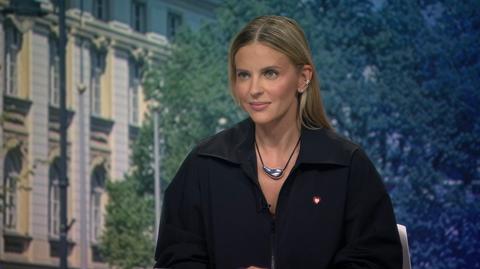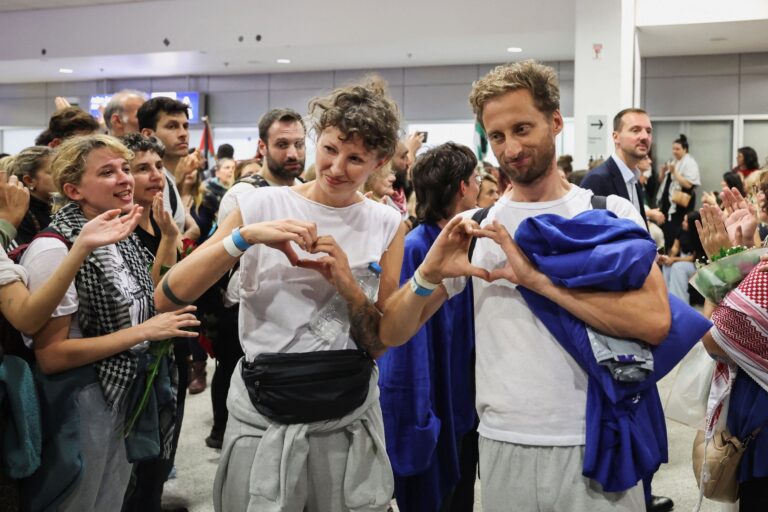Biznes Fakty
Gajewska: we want to counteract social tourism

„Our intention is to assist victims of war, while simultaneously addressing the issue of social tourism that has emerged in various Western nations. We are learning from their experiences,” stated Aleksandra Gajewska, Deputy Minister of Family, Labor, and Social Policy, during an interview on TVN24’s „Fakty po Faktach” program when asked about the government’s proposal to restrict foreigners’ access to benefits, including the 800+ program.
On Tuesday, a proposed bill aimed at limiting foreigners’ access to benefits was published on the Government Legislation Center’s website. This legislation would, among other things, tie eligibility for the 800+ benefit to the applicant’s engagement in the labor market and the enrollment of their children in Polish schools.
Read more: New benefits for foreigners. The government has introduced the proposal >>>
„We can refine certain mechanisms”
Aleksandra Gajewska, Deputy Minister of Family, Labor, and Social Policy, reiterated in the „Fakty po Faktach” program that the government’s objective is to support war victims while also aiming to mitigate social tourism, which has been a concern in other Western countries.
„The aid system we established for war victims has been a pillar of solidarity within Polish society—not only among public administration but among all citizens. Nevertheless, through evaluation and analysis, we can enhance certain mechanisms,” noted the minister.
She emphasized the importance of verifying whether individuals receiving benefits genuinely reside in Poland and are not merely visiting for the 800+ benefit while primarily living in Ukrainian cities unaffected by the conflict.
She clarified that the new legislation intends to tighten the criteria so that the 800+ benefit is accessible only to individuals living and working in Poland with children who are undergoing compulsory education. „We aim to ensure that benefits are not available to individuals who are not employed,” she stressed.
„We want to prevent scenarios where someone gains access to Polish benefits without any real connection to Poland or residence here. Based on the mechanisms put in place by our ministry and the Social Insurance Institution (ZUS), 19,000 individuals lost their benefits as we demonstrated that they had applied without justification,” she explained.
In response to a query about exceptions to the rule that only working individuals qualify for the 800+ benefit, Gajewska acknowledged that efforts are underway to develop solutions that consider the unique circumstances of certain groups.
„We’re concentrating on those who are most vulnerable, such as single mothers who are unable to work due to the special needs of their children,” she elaborated. She added that the bill requires specific references to legal statutes for it to be effective.
When asked if the bill would receive approval from both Minister Kierwiński and Minister Dziemianowicz-Bąk of the Left, Gajewska asserted that the government’s objectives are clearly outlined. „Our benefits system is designed to be robust and to support individuals who truly reside in Poland, whose children are enrolled in school or preschool, and who are employed,” she emphasized.
Safeguarding the image of children
Gajewska voiced her strong support for the bill that governs the publication of images of children under 13, particularly within educational settings. „I completely endorse this bill. I collaborate with MP Monika Rosa, and we share insights regarding concerning trends online,” she stated.
She highlighted that the issue of sharenting, or the excessive sharing of children’s images by parents, has serious implications.
„Young individuals liken it to passive smoking. Parents become addicted to sharing information about their children to receive positive reinforcement. The urge to showcase a child as wonderful or beautifully dressed results in consequences that children later endure. Nothing disappears online. Hate speech, deepfakes, and the exploitation of children’s images in pornographic materials are genuine threats we must combat,” she clarified.
The deputy minister stressed that parents „must recognize the ramifications of their actions.” „Posting pictures of children, for instance in daycares, does not necessitate showing their faces to convey the joy or ambiance of activities,” she indicated. She added that these regulations pertain to public institutions, but shifting parents’ mindsets is essential.
„A foundation that advocates for parents’ rights to control their child’s image must comprehend the distinction between what is beneficial for them and what is detrimental. A young child cannot consciously decide whether to be part of a parent’s online narrative, especially when it reaches millions and intimate moments of the child’s life are shared with hundreds of thousands or even millions of strangers. These children will confront the digital footprint left online well into their teenage and adult years,” Gajewska cautioned.
Referring to the proposed regulations, she noted that they draw inspiration from other initiatives within the European Union. „France is the pioneer in addressing this issue. We aim to learn from the experiences of other nations, as it is a global challenge that has yet to be explicitly regulated anywhere,” she explained.



